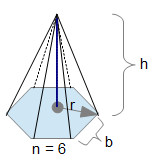Pyramid (polygon in circle base) - Weight
The Mass or Weight of a Pyramid calculator computes the mass or weight of a regular pyramid based on the dimensions of the polygon base, the height and the density of material.
mass or weight of a regular pyramid based on the dimensions of the polygon base, the height and the density of material.
INSTRUCTIONS: Choose units and enter the following:
- (n) Number of Sides on the Polygon Base
- (r) Radius of Polygon
- (h) Height of Pyramid
- (mD) Density of Material
| Common Mean Densities |
| Metals
|
| Fluids
|
Pyramid Mass or Weight (m): The calculator returns the mass in kilograms, the volume in cubic meters, and the area of the base in square meters. However, these can be automatically converted to compatible units via the pull-down menu.
The Math / Science
This Weight of Pyramid formula computes the weight or mass of a right pyramid of a base area, a height (h) and a (mD) mean density. The base area (A) is defined by a polygon of (n) sides each of length (b).
The formula for the mass of a regular pyramid is:
m=mD⋅16⋅h⋅n⋅r2⋅sin(2πn)
where:
- m = mass of the pyramid
- mD = density of material
- h = height of pyramid
- r = radius of the polygon base
- n = number of sides
The mean density(mD) of over 500 materials can found by clicking HERE.
Equations and Data Items
Calculators
- Comments
- Attachments
- Stats
No comments |
